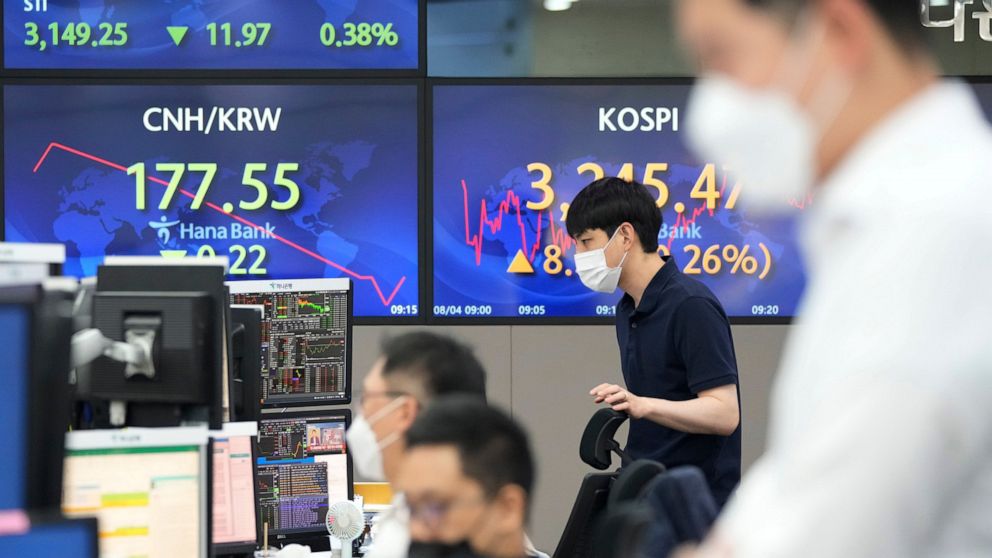Stocks slip on Wall Street, pulling S&P 500 below record
SINGAPORE — Stocks gave back some of their recent gains Wednesday after a disappointing jobs report stoked worry about the strength of the economic recovery as a highly contagious variant of the coronavirus spreads.
The S&P 500 fell 0.5%, easing back from the all-time high the benchmark index set a day earlier. Crude oil prices fell more than 3% and pushed energy companies lower. Industrial firms, banks, retailers, hotels and other companies that rely on direct consumer spending also fell. Those losses outweighed gains in technology and communication stocks.
Payroll processor ADP revealed a disappointing snapshot of the nation’s employment recovery, adding to concerns about the lagging recovery in the jobs market. ADP said the private sector added 330,000 jobs in July, falling far short of economists’ expectations. The report comes ahead of the Labor Department’s more comprehensive July jobs report on Friday.
“You’re getting some mixed signals, certainly, but we think we’ll get some good growth and the underlying economy is pretty good,” said Scott Wren, senior global market strategist at Wells Fargo Investment Institute.
The recovery in the jobs market will likely continue to be bumpy, but it’s on track to continue improving over the long term, he said.
The S&P 500 fell 20.49 points to 4,402.66. The Dow Jones Industrial Average dropped 323.73 points, or 0.9%, to 34,792.67. The Nasdaq composite added 19.24 points, or 0.1%, to 14,780.53. The Dow and Nasdaq each hit all-time highs just last week.
Stocks have been choppy this week as investors continue to pore over corporate earnings reports while reviewing economic data for clues as to how the economic recovery is going.
Wednesday’s jobs survey from ADP raised doubts that Friday’s broader July jobs report will exceed expectations. Economists are projecting that U.S. employers added 700,000 jobs last month, and that the national unemployment rate slipped to 5.7% from 5.9%, according to FactSet.
That outlook is now likely too optimistic, because of the sudden resurgence in COVID-19 cases due to the delta variant, Brad McMillan, chief investment officer for Commonwealth Financial Network, wrote Wednesday.
And if Friday’s job report shows a similar shortfall as the ADP survey, that “would signal that the job recovery has slowed, at a minimum,” McMillan wrote.
Traders also weighed an encouraging report on growth in the services sector, which makes up the bulk of the U.S. economy. The Institute for Supply Management reported that in July the sector grew at its fastest pace since the survey started in 2008.
Bond yields mostly recovered from an early slip following the release of the report. The yield on the 10-year Treasury dropped to 1.16%, down from 1.17% late Tuesday. It dipped as low as 1.13% in early trading.
The resurgence of COVID-19 with the highly contagious delta variant in spots around the world is also a key concern for Wall Street. China’s worst outbreak since the start of the pandemic a year and a half ago escalated Wednesday with dozens more cases around the country and the sealing-off of one city.
While analysts don’t expect the spike in infections to send the world back in to the lockdowns experienced a year ago, it could still stunt economic growth.
Still, worries about the delta variant, sluggish employment growth and signs the Federal Reserve is beginning to consider reducing its support for the economy amid rising inflation all point to “slowing growth later in the year, or more likely 2022,” said Jay Hatfield, CEO of Infrastructure Capital Advisors.
Investors are also still in the thick of corporate earnings season. The results have been solid so far. Roughly 75% of companies in the S&P 500 have turned in their earnings and the majority have been surprisingly good.
Strong profit and revenue results weren’t enough to lift stocks for many companies on Wednesday, however. General Motors fell 8.9% despite overcoming an industry-wide chip shortage to beat analysts’ profit expectations and raise its forecast. CVS Health slipped 2.9% after also reporting solid results.
Ticket seller and concert promoter Live Nation rose 1.5% after reporting surprisingly mild second-quarter loss. Cruise line operator Royal Caribbean Group slid 2.5% after its latest quarterly results fell short of analysts’ expectations.
Online broker Robinhood surged 50.4%, a big turnaround following its tepid stock market debut last week. Trading was volatile and had to be halted three times shortly after the market opened. Market experts have cautioned that Robinhood’s stock could be in for a jagged ride because of its popularity among smaller investors.
![]()


